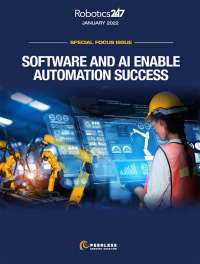inVia Robotics, the provider of the next generation of robotics warehouse automation solutions for e-commerce fulfillment centers, today announced $20 million in new funding. The Series B round was led by Point72 Ventures and included investments from Upfront Ventures and Embark Ventures. The funds will be used to boost the commercial deployment of inVia’s Picker robots and cloud-based Robotics-as-a-Service (RaaS) management system in warehouses as necessitated by the scaling e-commerce market.
“To compete with behemoths like Amazon, warehouse automation is critical for e-commerce companies; but the overhead cost of purchasing a fleet of robots is often beyond reach,” said Lior Elazary, founder and CEO of inVia Robotics. “We’re excited to have this funding to fuel the growth of our subscription-based RaaS technology to optimize warehouse performance and increase productivity for our customers.”
The inVia Picker robot works collaboratively alongside human workers to completely eliminate the need for operators to walk around the warehouse. This allows human workers to concentrate on more complex tasks like picking and quality control. This has the added benefit of minimizing operator exposure to dangerous warehouse operations such as forklifts, heavy lifting, etc. By automating the storage and retrieval process in this manner, inVia allows the warehouse to multiply human efforts by up to five times, enabling e-commerce warehouses to handle the tremendous growth in consumer demands. The unique subscription-based model allows companies of any size to implement robotic automation without the traditional hefty price tag. inVia’s holistic RaaS platform seamlessly integrates with any existing layout and software.
“E-commerce industry growth is driving the need for more warehouse automation to fulfill demand, and AI-driven robots can deliver that automation with the flexibility to scale across varied workflows. Our investment in inVia Robotics reflects our conviction in AI as a key enabler for the supply chain industry,” said Daniel Gwak, Co-Head, AI Investments at Point72 Ventures.
inVia Robotics’ Picker robots are deployed nationally across warehouses and distribution centers of all sizes, including Rakuten Super Logistics and Hollar. In total, over 100 Picker robots are being utilized within customer warehouses providing an overall efficiency boost of 300-400 percent. This funding will drive expansion across the company including a plan to double the current employee count by the end of the year. Additionally, funding will support the continued building of inVia Picker robots in Los Angeles, California.
“It was clear to us from day one that Lior and the inVia team have built a superior solution to tackle the $80B fulfillment warehouse automation market,” said Greg Bettinelli, Partner at Upfront Ventures. “We’ve been continually impressed with their product innovation and impressive commerce partner pipeline, and we’re thrilled to continue to support them.”
“Funding in robotics has been incredible over the past several years, and for good reason,” says John Santagate, Research Director for Commercial Service Robotics at Research and Analysis Firm IDC. “The growth in funding is a function of a market that has become accepting of the technology, a technology area that has matured to meet market demands, and vision of the future that must include flexible automation technology. Products must move faster and more efficiently through the warehouse today to keep up with consumer demand and autonomous mobile robots offer a cost-effective way to deploy automation to enable speed, efficiency, and flexibility.”
This additional financing brings the company’s total funding to $29 million to date.
inVia Robotics is a Southern Californian technology company founded in 2015 that provides the next generation of robotics warehouse automation solutions for e-commerce distribution centers and supply chains. As the developer of the world’s first “Robots-as-a-Service” autonomous mobile robot picking and goods-to-person system, inVia is powering the future of warehouse productivity without disrupting the ecosystem of a business’s operations.
Article topics
Email Sign Up


















